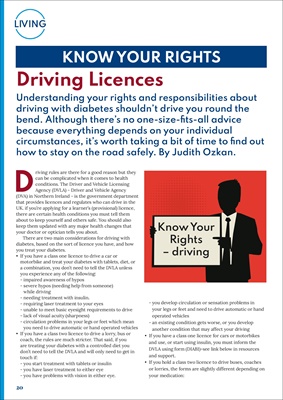
20
LIVING
Driving Licences
Understanding your rights and responsibilities about
driving with diabetes shouldn't drive you round the
bend. Although there's no one-size-fits-all advice
because everything depends on your individual
circumstances, it's worth taking a bit of time to find out
how to stay on the road safely. By Judith Ozkan.
Driving rules are there for a good reason but they
can be complicated when it comes to health
conditions. The Driver and Vehicle Licensing
Agency (DVLA) - Driver and Vehicle Agency
(DVA) in Northern Ireland - is the government department
that provides licences and regulates who can drive in the
UK. if you're applying for a learner's (provisional) licence,
there are certain health conditions you must tell them
about to keep yourself and others safe. You should also
keep them updated with any major health changes that
your doctor or optician tells you about.
There are two main considerations for driving with
diabetes, based on the sort of licence you have, and how
you treat your diabetes.
• If you have a class one licence to drive a car or
motorbike and treat your diabetes with tablets, diet, or
a combination, you don't need to tell the DVLA unless
you experience any of the following:
- impaired awareness of hypos
- severe hypos (needing help from someone)
while driving
- needing treatment with insulin.
- requiring laser treatment to your eyes
- unable to meet basic eyesight requirements to drive
- lack of visual acuity (sharpness)
- circulation problems in your legs or feet which mean
you need to drive automatic or hand operated vehicles
• If you have a class two licence to drive a lorry, bus or
coach, the rules are much stricter. That said, if you
are treating your diabetes with a controlled diet you
don't need to tell the DVLA and will only need to get in
touch if:
- you start treatment with tablets or insulin
- you have laser treatment to either eye
- you have problems with vision in either eye.
- you develop circulation or sensation problems in
your legs or feet and need to drive automatic or hand
operated vehicles
- an existing condition gets worse, or you develop
another condition that may affect your driving
• If you have a class one licence for cars or motorbikes
and use, or start using insulin, you must inform the
DVLA using form (DIAB1)-see link below in resources
and support.
• If you hold a class two licence to drive buses, coaches
or lorries, the forms are slightly different depending on
your medication:
KNOW YOUR RIGHTS
Know Your
Rights
- driving